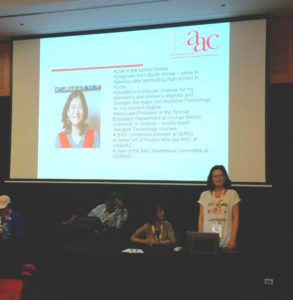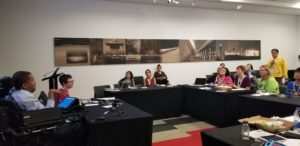Today we are pleased to welcome Yoosun Chung, USSAAC’s past Vice President, People Who Use AAC and their Families, to share her thoughts on this summer’s International Society for Augmentative and Alternative Communication (ISAAC) conference.
—–

Yoosun Chung speaking at ISSAAC
I recently came back from a beautiful city, Gold Coast, Australia, where I attended the 18th International Society for Augmentative and Alternative Communication (ISAAC) conference. The ISAAC conference is held biennially in a different country.
As an associate professor who teaches and researches assistive technology (AT) and related topics, I often attend AT-related conferences. Every time I attend a conference, I am excited to learn about newly developed ATs as well as have a chance to meet with people who work in this field. However, I would like to assert that my favorite conference is ISAAC because I know that I will have an opportunity to get to know more AAC users.
As an AAC user, I believe it would be cool if I could interact more with other AAC users in my everyday life. In reality, however, I seldom have the opportunity to interact with AAC users in either my personal or professional spheres. It is always incredibly exciting to attend the ISAAC conference and interact with AAC users of various ages, professions, and backgrounds.
At this conference, Diane Nelson Bryen and I presented a session entitled, “Use of Mainstream Personal Digital Assistants by Adults Who Use Speech Generating Devices.” The purpose was (1) to introduce the importance of intelligent digital assistants (IDA), such as Siri, Alexa, and OK Google to an AAC user and 2) to explore whether or not current IDAs can understand speech synthesizers used in speech generating devices.
In addition, I participated in the “Dare to LEAD” workshop held by the ISAAC LEAD

Dare to Lead Workshop
Committee. I am a member of this committee. The ISAAC LEAD Committee members are AAC users who are leaders in their respective societies. Members are from the East and West coast of America, Australia, Korea, and all around the world. The purpose of “Dare to LEAD” was for committee members (mentors) help participants (mentees) generate short- and long-term goals to support their personal journeys to leadership. After introductions of mentors and mentees, various presenters defined the terms leader and leadership and considered the path to becoming a leader. After that, mentor and mentee pairs discussed leadership goals and how to achieve them. Mentors will maintain regular contact with mentees and share their progress at the LEAD meetings that are held online every 6 weeks. We are planning to hold a second “Dare to LEAD” workshop at ISAAC 2020.
On another note, I am thrilled that Meredith Allan, an AAC user, is currently President-Elect of ISAAC. Kevin Williams, who is an also AAC user, is President-Elect of USSAAC. I am excited to see more and more AAC users take leadership roles in our society.
I just love the ISAAC conference theme in 2018: AACcess ALL Areas.
—–
Yoosun Chung, a professor at the Special Education Department of George Mason University, teaches several graduate level special education courses, mostly related to assistive technology, and uses an AAC device while lecturing due to her speech difficulties. Chung was selected as one of winners for the 2012 Teaching Excellence Awards at George Mason University. Her research interests are individuals who use AAC devices, individuals with disabilities and Internet, and individuals who have cerebral palsy. Chung received her bachelor’s degree from the George Mason University in computer science, her master’s degree from the Cornell University in computer science and doctoral degree from George Mason University with a focus in assistive technology. She has no financial or nonfinancial relationships to disclose.
Jill E Senner, PhD, CCC-SLP
SpeakUP
Editor-in-Chief
